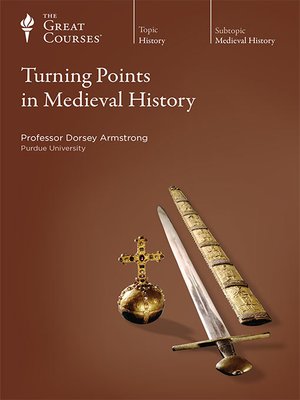
Sign up to save your library
With an OverDrive account, you can save your favorite libraries for at-a-glance information about availability. Find out more about OverDrive accounts.
Find this title in Libby, the library reading app by OverDrive.



Search for a digital library with this title
Title found at these libraries:
| Loading... |
For an accurate picture of how the political, social, and religious structure of present-day Europe came to be - and even why we're speaking English today - studying the key events between the years 500 and 1500 is of critical import. These 24 gripping lectures deliver an unparalleled look at these moments that profoundly changed the arc of history, and they weave the era's vast array of disparate events into an interconnected tapestry that illuminates why nothing exists in a vacuum. Among the events you'll experience: the moment in 711 A.D. when Tariq ibn Zayid conquered Spain and created the unusually tolerant society of Al-Andalus; the 1152 marriage between Eleanor of Aquitaine and Henry Plantagenet, which led to the Hundred Years' War and the War of the Roses; and the composition of Fibonacci's Liber Abaci in 1202, which transformed the medieval world of business, banking, and commerce. These are just three of the many turning points in the history of medieval Europe that prove the Middle Ages were far from "dark." Throughout these lectures, you'll investigate events, such as the Norman conquest of England in 1066, where the impact was immediate and tangible. In others, like the Great Schism between the Eastern and Western churches, the importance was not recognized for years; some developments had effects so gradual that their significance can only be recognized from the vantage point of history. Methodical and meticulous in its approach to a labyrinthine age, these lectures will help you understand why the West's transition from the classical to the early modern was a fluid, ongoing process rather than the result of a single pivotal moment.






